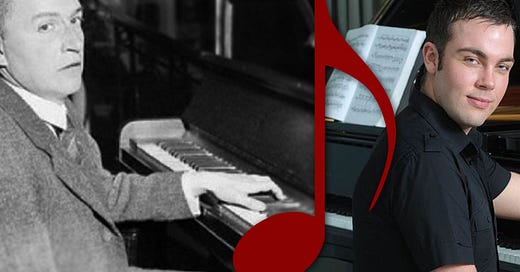The Century-Long Duet of Two Dazzling One-Handed Pianists
Nicholas McCarthy was born in the 1990s without a right hand. Paul Wittgenstein lost his in World War I—and then left behind a musical treasure trove that would change Nicholas’ life. Listen to our collaboration with the hit podcast Snap Judgement.
If someone tells me ‘No, I can’t do something,’ and I feel that I can see it, smell it, taste it — I can visualize me doing it — then to me that ‘no’ doesn’t feel real,” says pianist Nicholas McCarthy.
Born without his right hand, McCarthy taught himself how to play piano as a teenager after hearing a classmate’s performance of Ludwig van Beethoven’s Waldstein Sonata. He decided almost instantaneously that playing music was how he wanted to spend his life. He was later accepted into a conservatory, but he still needed something else: piano pieces designed to be played by people with one hand. Then he discovered an incredible musical legacy stretching back a century, all thanks to one little-known master musician.
Paul Wittgenstein was poised to be one of the 20th century’s greatest pianists. The son of a wealthy steel tycoon, visitors to his family’s household included the legendary composers Johannes Brahms, Gustav Mahler and Richard Strauss. Wittgenstein made his own piano debut in 1913 at Vienna’s Musikverein, one of the world’s most prestigious musical venues. Then World War I broke out. He was sent to the front lines, where he suffered a particularly devastating injury for a budding young musician: He was shot in the right arm, which had to be amputated.
From a frigid prisoner-of-war camp in Siberia, Wittgenstein resumed his piano practice on a wooden crate, the keys drawn out in charcoal. After the war, Wittgenstein used his family fortune to commission left-handed pieces from some of the world’s most notable composers, blazing a path for his own unique musical career to continue.
When young McCarthy learned about Wittgenstein’s remarkable story, he was determined to find everything he had written. He tracked down pieces Wittgenstein had arranged or commissioned, including some that had been out of print for decades. Playing those pieces, McCarthy went on to become the first one-handed pianist to graduate from London’s famed Royal College of Music. He is now a rising star in classical music, and has a career that would have been impossible without Paul Wittgenstein’s own unlikely journey a century earlier. And McCarthy is now commissioning left-handed pieces of his own, hoping to leave a legacy for future generations of disabled musicians, much as Wittgenstein did for him.
This story is an audio collaboration with the hit podcast Snap Judgment. Click play below to listen.
Ilena Peng is a reporter at Bloomberg
Brendan Spiegel is the Editorial Director and co-founder of Narratively




